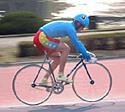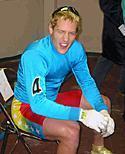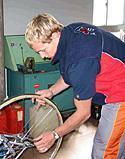
Recently on Cyclingnews.com |
Introduction to Track Racing - What's a Wheelrace? - Introduction to Six Day racing - UCI codes
An interview with Jobie Dajka
Show me the money!
World keirin champ Jobie Dajka is back home in Australia after making his mark at the international keirin series in Japan. With his recently-announced selection for the Australian team that will travel to the World's in Stuttgart in August, it's now time to focus on retaining his title. He spoke with Karen Forman about Japan and the future.
 |
After winning the world keirin championship last year, there was only one place for Adelaide rider Jobie Dajka to go to prove his mettle in the discipline: Japan for the lucrative international keirin series that runs from March to May.
In the five-race series Dajka, 21, proved himself more than deserving of the title in Japan, collecting three wins, a second and a third, and winning the series overall. But in any competitive sport, you're only as good as your last race and with the series complete, he is now back home contemplating his next move - to Germany next month, where the pressure will be on to retain his world title.
Dajka is first to admit it's not going to be a walk in the park. After spending three months in Japan in close contact with the riders who will be his opponents, he is well aware that competition will be extremely tough. "The people I raced against this year were Feidler from Germany, Wolff from Germany, Gane from France, Maclean from Great Britain, Boss from the Netherlands, Villeneva from Spain and Kiksis from Latvia," he said. "I will more than likely be racing all of these guys at the worlds. Especially Feidler and Gane. They are both two of my biggest rivals at the worlds this year and also at the Games next year."
But he's not too fazed by the prospect of coming up against those riders again. In fact, he shows just how gutsy he is when you ask him what his "dream" event would be - and he says he would like it to be a keirin (not surprising) featuring the world's best at the particular times they were the best.
"If I had one more race to race it would be a keirin race with Heshlick from Germany (with his '80s form), Hubner from Germany ('90s form), Feidler from Germany ('92 or '96 form), Neiwand from Australia ('93 form), Rousseau from France ('96-'98 form) and me," he said.
 |
"These are the guys who were the best in their times and I would love to have this race whenever I am at my best (whenever that will be in the future) to see where I rate in the big picture. I love a challenge, I would love to line up at the world's, look at the other guys and think, 'give me your best and we'll see if it is good enough.' One thing I know is that the best man always wins in track sprinting."
One thing's for sure: it takes a lot of courage to front up for the keirins in Japan, even when you have been specifically invited.
"I suppose I was invited because I won the keirin at the World's," Dajka says pragmatically. "It went really well. Out of the five races we had, I finished first, first, third, second and first. I trained really hard and made sure I had really good form before I left and I got the results I was after so I was really happy with the trip.
"I also had pretty good form for the series last year and the Japanese take that into consideration when selecting for the series, along with world cups and the world championships."
So, for the unitiated, how does it work?
"Each race consists of three days of racing," Dajka explains. "Heats one day, semis the next, followed by the big final the next day. There is an A and a B heat each day. There are nine riders in each heat. To stay in the A heat, you must finish in the first six, and the last three get demoted to the B the next day.
"You must finish in the top three in the B final to advance to the A final the following day. The Japanese riders change each venue, but the international riders are the same."
So is it true that riders are locked away before and during races?
"The riders can actually talk to each other, but we are locked inside an impound for three days to prevent us from having contact with anyone on the outside. The keirins are similar to horse racing here in Australia. There is so much money gambled, that money is a lot more important than anywhere I have ever seen. But the top riders are very professional and love the sport as well as enjoying their huge pay packets."
 |
And what of rumours of race fixing to make the events more exciting for spectators?
"There is never any race fixing as far as I am aware. I like to be more professional than that. I race to win every time I step out into the arena. Race fixing does not exist."
Well, speaking of money . . .
"You make prize money in Japan. I keep the amounts to myself though!"
Dajka says the standard of competition in the keirins is higher than the world cups, but not as high as the world championships.
Any funny stories to recount?
"Yeah. When the officials open the gate for us to go out and race, the Japanese riders shout, 'SHOOS'.
"Feidler told me that this means 'show me the money' in Japanese (of course it doesn't!). So the first race when they opened the gate, I shouted, 'SHOW ME THE MONEY!' Everyone just looked at me and laughed. Then I looked around and Feidler is cracking up laughing! I said, 'yeah, thanks mate, you got me.' But the Japanese loved it. So I made it tradition of my pre race drill to shout 'show me the money!' Now every time we have a beer, instead of saying 'cheers', everyone says 'show me the money!' In between heats we do what ever we can to keep ourselves amused. Normally playing tricks like these on each other. "
When at home in Australia, Dajka lives in the suburb of Unley in Adelaide (where the Australian Institute of Sport is based) with his mate Gav.
Training there is intense.
"Normally we do three times a week gym, three track sessions and maybe seven hours on the road a week," he says. "Better not tell you much more or (head coach) Martin Barras might tell me off!"
Originally inspired to take up cycling after watching the Olympics on television, Dajka says he is now inspired to keep training by three athletes - and amazingly, they don't include other riders.
"(Basketballer) Michael Jordan, (golfer) Tiger Woods and (fighter) Muhammad Ali," he says. "Simply because they dominated their sports."
He says his favourite race to date was the Worlds last year: "Coming down the finishing straight knowing no-one is gonna get around me. It's the best feeling I have ever had."
He prefers the match racing because "you need brains as well as the legs. You need the whole package."
It's obvious Dajka loves his bike riding and his competition. But you have to wonder how he survives, considering so many of his track riding peers make the change to the much more lucrative sport of road racing.
"I survive as a trackie in Australia just by enjoying it," he says. "Money is not an issue, I am living my dreams. If I am flipping burgers in 15 years, it doesn't phase me at all because I am living my life and enjoying my sport that I love.
"The day I stop enjoying is the day I hang up my shoes."
